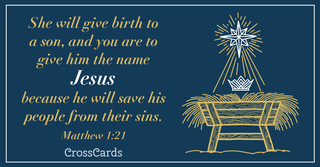- Recent Translations
- All Translations
Matthew 1:23
Share
Settings
Matthew 1:23 in Other Translations
Matthew 1:23 Meaning and Commentary
Behold, a virgin shall be with child
These words are rightly applied to the virgin Mary and her son Jesus, for of no other can they be understood; not of Ahaz's wife and his son Hezekiah, who was already born, and must be eleven or twelve years of age when these words were spoken; nor of any other son of Ahaz by her or any other person since no other was Lord of Judea; nor of the wife of Isaiah, and any son of his, who never had any that was king of Judah. The prophecy is introduced here as in Isaiah with a "behold!" not only to raise and fix the attention, but to denote that it was something wonderful and extraordinary which was about to be related; and is therefore called (twa) a "sign", wonder, or miracle; which lay not, as some Jewish writers F7 affirm, in this, that the person spoken of was unfit for conception at the time of the prophecy, since no such thing is intimated; or in this, that it should be a son and not a daughter F8, which is foretold; for the wonder lies not in the truth of the prediction, but in the extraordinariness of the thing predicted; much less in this F9, that the child should eat butter and honey as soon as born; since nothing is more natural and common with new born infants, than to take in any sort of liquids which are sweet and pleasant. But the sign or wonder lay in this, that a "virgin" should "conceive" or "be with child"; for the Evangelist is to be justified in rendering, (hmle) by (paryenov) "a virgin"; by the Septuagint having so rendered it some hundreds of years before him, by the sense of the word, which comes from (Mle) and which signifies to "hide" or "cover"; virgins being such who are unknown to, and not uncovered by men, and in the Eastern countries were kept recluse from the company and conversation of men; and by the use of the word in all other places, ( Genesis 24:43 ) ( Exodus 2:8 ) ( Psalms 68:25 ) ( Song of Solomon 1:3 ) ( 6:8 ) ( Proverbs 30:19 ) . The last of these texts the Jews triumph in, as making for them, and against us, but without any reason; since it does not appear that the "maid" and the "adulterous woman" are one and the same person; and if they were, the vitiated woman might be called a maid or virgin, according to her own account of herself, or in the esteem of others who knew her not, or as antecedent to her defilement; see ( Deuteronomy 22:28 ) . Besides, could this be understood of any young woman married or unmarried, that had known a man, it would be no wonder, no surprising thing that she should "conceive" or "be with child", and "bring forth a son". It is added,
and they shall call his name Emmanuel.
The difference between Isaiah and Matthew is very inconsiderable, it being in the one "thou shalt call", that is, thou virgin shalt call him by this name; and in the other "they shall call", that is, Joseph, Mary, and others; for, besides that some copies read the text in Matthew (caleseiv) "thou shalt call", the words both in the one and the other may be rendered impersonally, "and shall be called"; and the meaning is, not that he should be commonly known and called by such a name, any more than by any, or all of those mentioned in ( Isaiah 9:6 ) , but only that he should be so, which is a frequent use of the word; or he should be that, and so accounted by others, which answers to the signification of this name, which the Evangelist says,
being interpreted is God with us:
for it is a compound word of (la) "God" and (wnme) "with us", and well agrees with Jesus, who is God in our nature, the word that was made flesh and dwelt among us. ( John 1:14 ) , and is the one and only Mediator between God and us, ( 1 Timothy 2:5 ) F11. So the Septuagint interpret the word in ( Isaiah 8:8 ) .
F7 Jarchi. in Isa. vii. 14.
F8 Gaon. in Aben Ezra, in ib.
F9 Kimchi & Aben Ezra in ib. R. Isaac Chizuk. Emun. p. 1. c. 21.
F11 See more of this in a book of mine, called "The Prophecies of the Old Testament concerning the Messiah, literally fulfilled in Jesus", ch. 5. p. 92, 93
Matthew 1:23 In-Context
Cross References 1
-
1.
Isaiah 7:14 ;Isaiah 8:8,10
Footnotes 1
- [a] Isaiah 7:14

